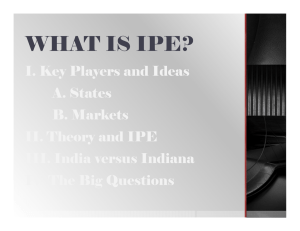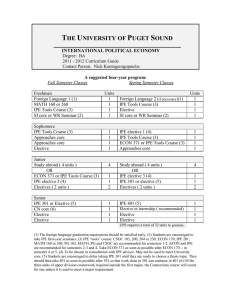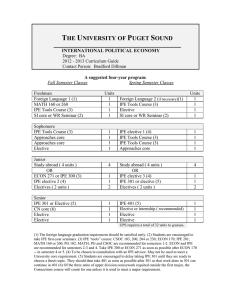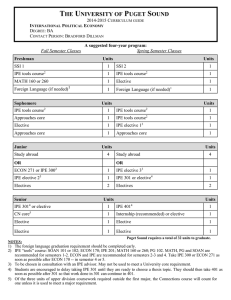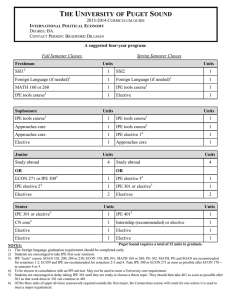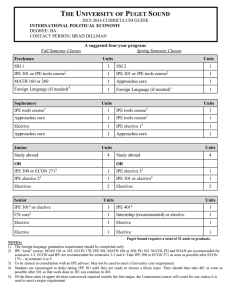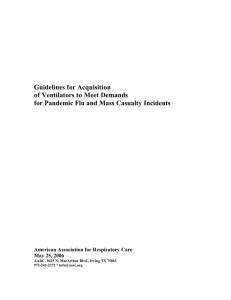IPE Program Map for RT
advertisement
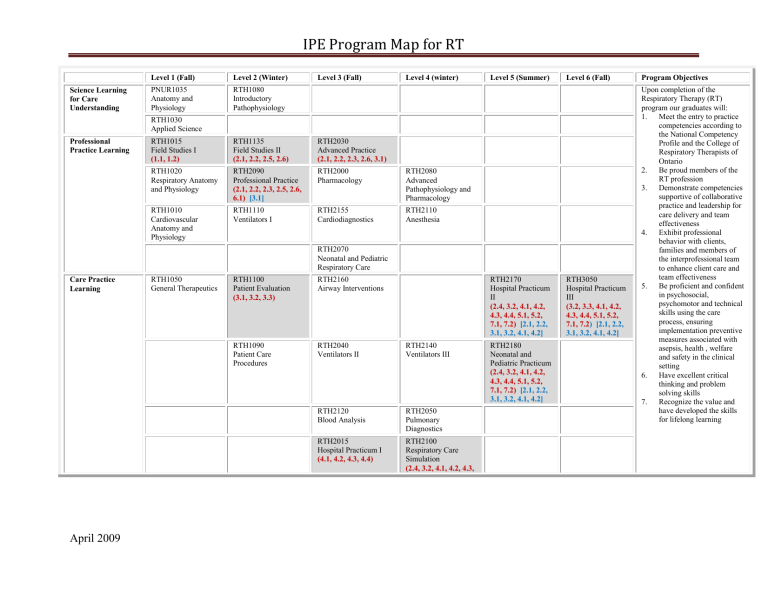
IPE Program Map for RT Science Learning for Care Understanding Level 1 (Fall) Level 2 (Winter) PNUR1035 Anatomy and Physiology RTH1080 Introductory Pathophysiology Level 3 (Fall) Level 4 (winter) Level 5 (Summer) Level 6 (Fall) RTH1030 Applied Science Professional Practice Learning RTH1015 Field Studies I (1.1, 1.2) RTH1135 Field Studies II (2.1, 2.2, 2.5, 2.6) RTH2030 Advanced Practice (2.1, 2.2, 2.3, 2.6, 3.1) RTH1020 Respiratory Anatomy and Physiology RTH2090 Professional Practice (2.1, 2.2, 2.3, 2.5, 2.6, 6.1) [3.1] RTH2000 Pharmacology RTH2080 Advanced Pathophysiology and Pharmacology RTH1010 Cardiovascular Anatomy and Physiology RTH1110 Ventilators I RTH2155 Cardiodiagnostics RTH2110 Anesthesia RTH2070 Neonatal and Pediatric Respiratory Care Care Practice Learning April 2009 RTH1050 General Therapeutics RTH1100 Patient Evaluation (3.1, 3.2, 3.3) RTH2160 Airway Interventions RTH2170 Hospital Practicum II (2.4, 3.2, 4.1, 4.2, 4.3, 4.4, 5.1, 5.2, 7.1, 7.2) [2.1, 2.2, 3.1, 3.2, 4.1, 4.2] RTH1090 Patient Care Procedures RTH2040 Ventilators II RTH2140 Ventilators III RTH2120 Blood Analysis RTH2050 Pulmonary Diagnostics RTH2015 Hospital Practicum I (4.1, 4.2, 4.3, 4.4) RTH2100 Respiratory Care Simulation (2.4, 3.2, 4.1, 4.2, 4.3, RTH2180 Neonatal and Pediatric Practicum (2.4, 3.2, 4.1, 4.2, 4.3, 4.4, 5.1, 5.2, 7.1, 7.2) [2.1, 2.2, 3.1, 3.2, 4.1, 4.2] RTH3050 Hospital Practicum III (3.2, 3.3, 4.1, 4.2, 4.3, 4.4, 5.1, 5.2, 7.1, 7.2) [2.1, 2.2, 3.1, 3.2, 4.1, 4.2] Program Objectives Upon completion of the Respiratory Therapy (RT) program our graduates will: 1. Meet the entry to practice competencies according to the National Competency Profile and the College of Respiratory Therapists of Ontario 2. Be proud members of the RT profession 3. Demonstrate competencies supportive of collaborative practice and leadership for care delivery and team effectiveness 4. Exhibit professional behavior with clients, families and members of the interprofessional team to enhance client care and team effectiveness 5. Be proficient and confident in psychosocial, psychomotor and technical skills using the care process, ensuring implementation preventive measures associated with asepsis, health , welfare and safety in the clinical setting 6. Have excellent critical thinking and problem solving skills 7. Recognize the value and have developed the skills for lifelong learning IPE Program Map for RT 4.4, 5.1, 5.2, 6.2, 6.3, 7.1, 7.2) [1.1, 1.2, 2.1, 2.2, 4.1, 4.2] General Knowledge for Personal Development Elective Elective = opportunities for integration of IPE outcomes Basic IPE Outcomes Advanced IPE Outcomes April 2009 Elective
